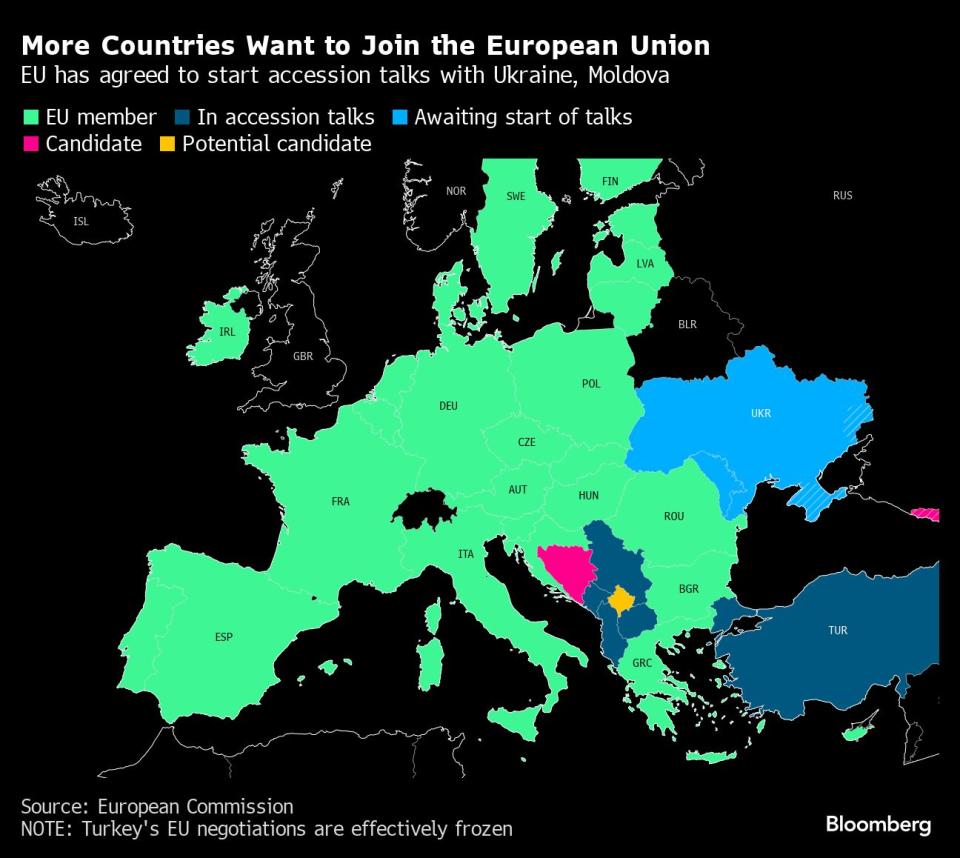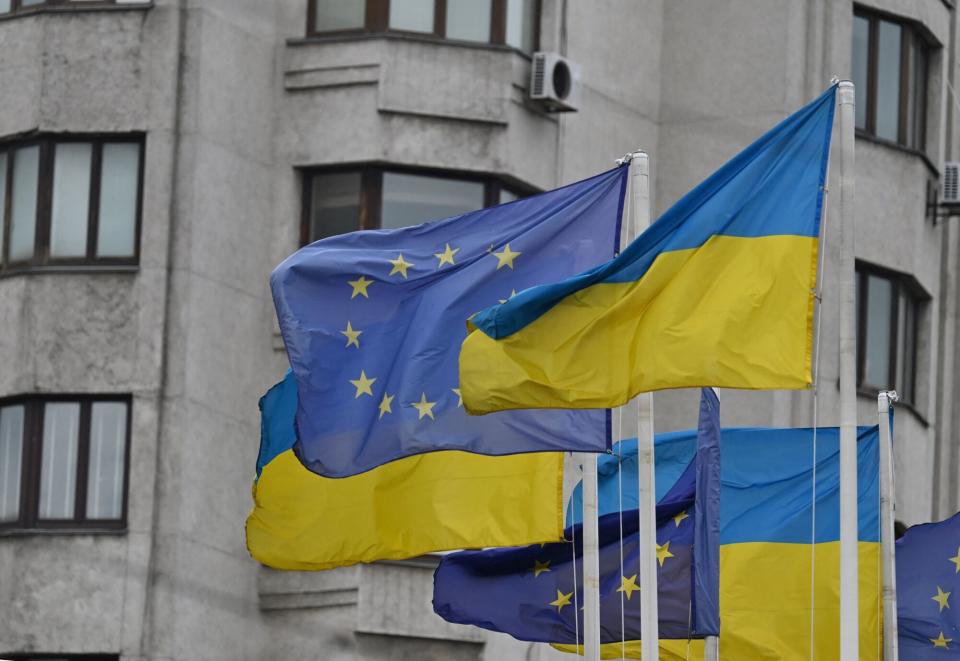Hungary Vetoes Ukraine Aid After EU Backs Membership Talks
- Oops!Something went wrong.Please try again later.
(Bloomberg) -- Hungarian Prime Minister Viktor Orban blocked the European Union’s planned financial aid package for Ukraine, sending the debate into early next year as the EU struggles to counter concerns that Western support is faltering.
Most Read from Bloomberg
China’s Real Estate Meltdown Is Battering Middle Class Wealth
Dimon’s Heir at JPMorgan Still Hazy as ‘Five More Years’ Tick By
Kyiv notched a significant political victory when the EU unexpectedly agreed to open membership talks, but the success was overshadowed after talks over a €50 billion ($54 billion) package broke down, even with 26 of the 27 members backing it.
The aid delay is likely to increase anxiety in Kyiv at a critical moment for the war-torn country. Ukraine’s counteroffensive, backed by billions in western weapons and training, has made limited progress. And in the US, the House of Representatives went into a holiday recess this week after failing to approve President Joe Biden’s request for $61 billion in assistance to Ukraine.
https://t.co/7Gea5JjusH pic.twitter.com/Qzz94DN8sm
— Bloomberg TV (@BloombergTV) December 14, 2023
European leaders will be back in Brussels in late January or early February for an extra summit, European Council President Charles Michel said Friday, with leaders aiming to find a way to bring Hungarian Prime Minister Viktor Orban on board.
The EU will also start looking for way to get around Hungary’s intransigence. The back-up options include carving out Hungary’s contribution to aid bound for Ukraine, or having member states funnel money to Kyiv outside of the EU budget process.
“We will use the time before the next council,” European Commission President Ursula von der Leyen said at a news conference after the summit ended. “Either we will have an agreement of 27, or we will have alternatives that we can then make operational when the time comes for this next council.”
German Chancellor Olaf Scholz said he was “quite confident” the EU will reach a deal early next year. He also pushed back against the suggestions there could be any connection between Budapest being granted full access to its blocked funds in return for its consent to unblock Kyiv’s aid.
Orban said in a post on X that he vetoed extra money for Ukraine, adding, “We will come back to the issue next year in the #EUCO after proper preparation.”
The amount of newly committed Western aid for Ukraine has dropped to its lowest level since the start of Russia’s invasion almost two years ago. Meanwhile, the Kremlin has ramped up military production at home and intensified its bombing campaign deep inside the country.
European leaders said there’s time to solve the funding issue before Kyiv runs into trouble.
“We’ve been told it won’t be an immediate catastrophe for Ukraine, there are also other programs,” Luxembourg’s new prime minister, Luc Frieden, told reporters. “The whole review counts for the next four years, so six weeks aren’t the end of the story.”
Kyiv can take some solace in the unexpected progress on membership talks. Prior to EU leaders meeting in Brussels, Orban had opposed opening the accession process, saying Ukraine wasn’t ready and that the topic should be removed from the summit agenda.
Read more: What Ukraine’s EU Candidacy Means, and What’s Ahead: QuickTake
In the end, Orban wasn’t in the room for the final vote on membership talks with Kyiv, according to two people familiar with the matter. It required unanimous approval of EU member states, and nobody objected to the decision, the people said. Scholz suggested Orban leave the room to allow the bloc to move forward for now, one person added.
Michel called the decision “a clear signal of hope for their people and for our continent” in a post on X. He said that EU leaders meeting in Brussels also agreed to open accession talks with Moldova, granted candidate status to Georgia and said negotiations could begin with Bosnia once it meets the criteria.
Orban, for his part, confirmed he stayed away from the vote, blasting the decision as “senseless, irrational, wrong.”
The move is a somewhat symbolic one. The bloc won’t launch the more formal negotiating framework before March, when Ukraine has been asked to meet several additional conditions related to its membership bid.
Even with a green light from member states, the negotiations would still take years as the path to membership is lengthy and complicated. Croatia was the last country to join the bloc and its application lasted 10 years before it was formally accepted in 2013.
“Membership won’t happen overnight or even in a few years time,” Irish Prime Minister Leo Varadkar told reporters. “But we look forward to welcoming new members in the years ahead.”
Failing to open accession talks would have been a severe blow for Ukraine, after it invested so much time, energy and reforms in the process. It also could have damaged the EU’s reputation in the country, as the bloc falls short on a key plank of its support.
Ukrainian Foreign Minister Dmytro Kuleba said earlier this week that of all the issues on the table at the summit, opening accession talks was “the mother of all decisions, the most important decision.”
The commission said that before negotiations could start, Kyiv would need to enact legislation on minorities and corruption, and to regulate lobbying to bring it in line with European standards, among other steps. Kuleba said of the four laws the EU demanded it introduce by March, Ukraine has already signed three of them into law and the fourth would soon be adopted.
The developments in Brussels confirmed Orban’s image of being the most Kremlin-friendly leader in the 27-member bloc, who’s repeatedly called on western allies to end financial support for Ukraine and force it to negotiate peace terms with Russia.
The Hungarian leader stunned EU capitals by holding talks with Russian President Vladimir Putin in Beijing in October. It was the first bilateral meeting between an EU head of government and Putin since an international warrant was issued against the Russian leader for Moscow’s alleged war crimes in Ukraine.
Hungary’s foreign minister, Peter Szijjarto, has been to Moscow several times since Russia’s invasion and has met his Russian counterpart, Sergei Lavrov, also outside of Russia — most recently on the sidelines of an OSCE conference in North Macedonia last month. He also met Lavrov at the UN General Assembly in September in New York.
EU nations also reached a tentative agreement on a 12th package of sanctions against Russia, including a ban on Russian diamonds and measures to better enforce the price cap on Russian oil, according to people familiar with matter. The sanctions deal will become official after Austria lifts a technical objection and the measure clears procedural steps.
Meanwhile, Ukraine’s difficulties in making progress in its counteroffensive against Russia has raised questions about Ukrainian President Volodymyr Zelenskiy’s pledges to fight to victory and has complicated the allies’ backing.
A new poll showed the share of Ukrainians ready to make territorial concessions to Russia in exchange for peace has almost doubled in the past seven months.
“For us it’s very important that there’s a consistent, reliable funding for Ukraine,” von der Leyen said. “It’s important for Ukraine, but it’s also important for the business environment and investors.”
--With assistance from Zoltan Simon, Kateryna Chursina, Katharina Rosskopf, Stephanie Bodoni, Natalia Ojewska, Alberto Nardelli, John Follain, Slav Okov, Maria Tadeo, Natalia Drozdiak, Andra Timu and Lyubov Pronina.
(Updates with post-summit remarks starting in paragraph four.)
Most Read from Bloomberg Businessweek
©2023 Bloomberg L.P.



